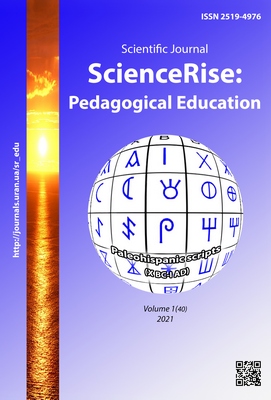The influence of the lexical and grammatical component of speech on the formation of speech competence of younger adolescents in primary school
DOI:
https://doi.org/10.15587/2519-4984.2021.224665Keywords:
teenager, speech competence, speech competency, personality, self-development, school environmentAbstract
In the article, the author points out the need for the development of a speech personality in educational institutions as a prerequisite for the development of harmonization of the personality, its successful socialization in society. Modern documents and regulations indicate exactly this. A number of statistical data is also provided on the insufficient level of development of the adolescents' speech competence as a component of the communicative competence, which in turn creates unfavorable conditions for the adolescent's socialization and his/her adaptation in society.
The article also examines the features of the development of the lexical and grammatical component of the speech of younger adolescents in the conditions of primary school as a necessary component of the speech competence formation. The necessity of developing a special speech environment in a school is substantiated, the participants of which should be both objects of educational influence (adolescents) and teachers, specialists working in the educational space of a basic school. According to the results of the experiment, the peculiarities of the development of the lexical and grammatical aspects of speech of adolescents, studying in the inclusive environment of the primary, school are determined. The analysis of the influence of the level of formation of the lexical and grammatical aspect of speech on the formation of negative character traits in adolescents is carried out. The necessity of correction of speech disorders in adolescents has been proved in order to prevent difficulties in the educational process and socialization of the personality. These facts, in turn, prove the need for active speech therapy support for younger adolescents in a basic school environment
References
Pro Natsionalnu stratehiiu rozvytku osvity v Ukraini na period do 2021 roku (2013). Ukaz Prezydenta Ukrainy No. 344/2013. 25.06.2013. Available at: https://zakon.rada.gov.ua/laws/show/344/2013#Text
Pro osnovni kompetentsii dlia navchannia protiahom usoho zhyttia (2006). Rekomendatsiia 2006/962/YeS Yevropeiskoho Parlamentu ta Rady (YeS). 18.12.2006. Available at: https://zakon.rada.gov.ua/laws/show/994_975#Text
Nikolaieva, S. Yu. (Ed.) (2003). Zahalnoievropeiski Rekomendatsii z movnoi osvity: vyvchennia, vykladannia, otsiniuvannia. Kyiv: Lenvit, 273.
Makhinov, V. (2015). Rozvytok profesiinoho movlennia studentiv yak zasib formuvannia movnoi osobystosti maibutnoho vchytelia. Pedahohika vyshchoi ta serednoi shkoly, 44, 84–91.
Hubar, O. (2018). Pereoriientatsiia zmistu lohopedychnoi roboty z pidlitkom v umovakh hlobalizatsiinykh protsesiv. Vytoky pedahohichnoi maisternosti. Poltava, 22, 68–73.
Kalmykova, L. O., Kalmykov, H. V., Lapshyna, I. M., Kharchenko, N. V; Kalmykova, L. O. (Ed.) (2008). Psykholohiia movlennia i psykholinhvistyka: Navchalnyi posibnyk dlia studentiv vyshchykh navchalnykh zakladiv. Kyiv: PereiaslavKhmelnytskyi pedahohichnyi instytut, v-vo “Feniks”, 245.
Kasianova, O. V. (2011). Formuvannia komunikatyvnoi kompetentnosti molodshykh pidlitkiv u hromadskykh dytiachykh obiednanniakh. Kyiv: Instytut problem vykhovannia NAPN Ukrainy, 21.
Tsaryk, O. M. (2015). Metodychni aspekty formuvannia kultury movlennia u shkolakh Halachyny mizhvoiennoho periodu KhKh st. Naukovyi visnyk Uzhhorodskoho natsionalnoho universytetu. Seriia: Pedahohika. Sotsialna robota, 37, 189–192.
Stefanyshyn, K. (2017). Robota nad pryimennykom u 5 klasi yak pidhotovchyi etap do usvidomlennia yoho komunikatyvnoi roli u strukturi movlennia. Naukovyi visnyk Uzhhorodskoho natsionalnoho universytetu. Seriia : Pedahohika. Sotsialna robota, 1 (40), 276–278.
10.Van Ek, J. A. (1986). Objectives for foreign language learning. Vol. 1: Scope. Strasbourg Council of Europe Press, 89.
Pentyliuk, M., Bakum, Z., Horoshkina, O., Karaman, S., Karaman, O. et. al.; Pentyliuk, M. (Ed.) (2011). Praktykum z metodyky navchannia ukrainskoi movy v zahalnoosvitnikh zakladakh: modulnyi kurs. Kyiv: Lenvit, 366.
Kalinina, L. M., Meleshko, V. V., Osadchyi, I. H., Parashchenko, L. I., Topuzov, M. O.; Kalinina, L. M. (Ed.) (2018). Upravlinnia vsebichnymy navchalnymy zakladamy yak aktyvnymy systemamy: modeli ta mekhanizmy. Kyiv: Pedahohichna dumka, 224.
Holub, N. (2008). Rytoryka u vyshchii shkoli:monohrafiia. Cherkasy: Brama Ukrainy, 318.
Kostolovych, T. V. (2019). Formuvannia komunikatyvnoi kompetentnosti maibutnikh uchyteliv ukrainskoi movy i literatury u protsesi navchannia fonetyky y orfoepii. Kyiv: Kyivskyi universytet imeni Borysa Hrinchenka, 24.
Chebotarova, I. O. (2018). Formuvannia komunikatyvnoi kompetentnosti maibutnikh kerivnykiv zakladiv osvity v umovakh mahistratury. Kharkiv: Ukrainska inzhenerno-pedahohichna akademiia, 26.
Prohramy dlia zahalnoosvitnikh navchalnykh zakladiv «Ukrainska mova. 5–12 klasy» Lyst MON vid 23.12.2004 No. 1/11-6611. Kyiv: Rerun, 192.
Downloads
Published
How to Cite
Issue
Section
License
Copyright (c) 2021 Ольга Григорьевна Губарь

This work is licensed under a Creative Commons Attribution 4.0 International License.
Our journal abides by the Creative Commons CC BY copyright rights and permissions for open access journals.
Authors, who are published in this journal, agree to the following conditions:
1. The authors reserve the right to authorship of the work and pass the first publication right of this work to the journal under the terms of a Creative Commons CC BY, which allows others to freely distribute the published research with the obligatory reference to the authors of the original work and the first publication of the work in this journal.
2. The authors have the right to conclude separate supplement agreements that relate to non-exclusive work distribution in the form in which it has been published by the journal (for example, to upload the work to the online storage of the journal or publish it as part of a monograph), provided that the reference to the first publication of the work in this journal is included.







